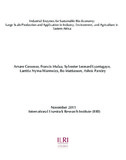| dc.identifier.citation | Gessesse, A. Mulaa F., Lyantagaye S., Nyina-Wamwiza L., Mattiasson B., Pandey A. 2011. Industrial Enzymes for Sustainable Bio-Economy: Large Scale Production and Application in Industry, Environment, and Agriculture in Eastern Africa. Nairobi, Kenya, ILRI. | en |
| dc.description.abstract | To date Africa’s participation in the global economy is largely confined to supplying raw materials. Adding
value to these raw materials is expected to lead to economic growth and improvement in the standard of
living. In Eastern Africa, because of availability of raw materials, developing capacity in the leather, textile,
pulp and paper, detergent, and starch industries is believed to offer competitive advantages. However, some
of these industries are highly associated with environmental pollution.
Recently developments in industrial biotechnology, defined as the use of enzymes or microorganisms for
industrial processes, has offered a viable option to decrease or avoid environmental pollution from such
industrial activities. Widespread use of enzymes in industrial processes, in addition to lowering the level of
pollution, could lead to improvement in product quality and/or process efficiency. Thus, availability of
enzymes locally with affordable price and with expert support on their use is expected to have significant
contribution in the region by lowering environmental pollution and by replacing several imported chemicals
as processing aids. Furthermore, because of the availability of extremely unique habitats, such as alkaline
environments, hot springs, etc with huge microbial diversity, the region could be, in the long term, highly
competitive in the global industrial enzyme market. For example, one enzyme isolated by Genecor, an
American biotech company, from a Kenyan soda lake was estimated to earn the company over US $600
million annually.
In the last few decades, through research conducted in the different institutions several novel microbial strains
producing potentially attractive enzymes for industrial application were isolated and characterized.
Cultivation conditions for these organisms have also been optimized. Evaluation of some of these enzymes
under application conditions gave extremely encouraging results. Given the importance of these enzymes in
serving as processing aids in different industries in the region and their role in significantly reducing
environmental pollution, scaling up of production processes and use of the enzymes at industrial scale is felt
absolutely essential. The main objectives of this study are therefore, to scale up production, optimize enzyme
stabilization and formulation, and test the enzymes under application conditions.
Enzyme producing microbial strains earlier isolated will be grown in large scale using solid state fermentation
or submerged fermentation. The enzymes will be concentrated, stabilized, and formulated for industrial
application. These enzymes will then be used for leather processing, textile processing, protein hydrolysis,
detergent formulation, as animal feed additive, pulp bio bleaching, etc. Testing will be carried out at factory
settings in different factories in the region. For products where enzymes are already in use (such as bating
agents in the leather industry) the new enzymes will be compared with commercial enzymes and the best
enzyme selected and promoted for use in the region. For processes where enzymes are not used (usually for
reason of cost) factories will be encouraged to adopt the technology by giving them free samples.
The technology developed will then be popularized through different channels. A workshop will be organized
for enzyme users in the region and different industries will be encouraged to use these products. Similarly
workshops will be organized for business people in the region to attract their attention and encourage them to
invest in this technology. A company specialized in the production of industrial enzymes in partnership with
private sector (and if necessary foreign partners) will be established.
Successful implementation of this project is expected to help the region to develop the industrial sector with
little or no environmental pollution. As Africa’s microbial biodiversity is unique, in the medium to long term,
the region could gain access to a significant slice of the global enzyme market. | en |

